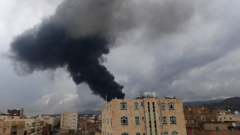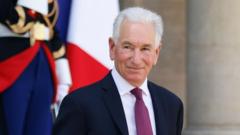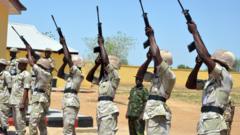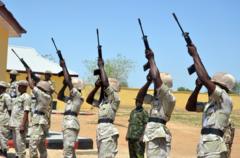Israeli military launches retaliatory strikes on Houthi targets in Yemen following their reported use of cluster munitions in missile attacks directed at Israel.
**Israeli Airstrikes Target Yemeni Houthis After Cluster Bomb Threats**

**Israeli Airstrikes Target Yemeni Houthis After Cluster Bomb Threats**
Israel responds to Houthi missile attack with airstrikes in Sanaa, escalating regional tensions.
Israel has conducted targeted airstrikes against Houthi military installations in Sanaa, Yemen, following a missile attack by the Houthis that the Israeli military claims involved banned cluster munitions. The strikes were described as retaliatory actions after the missile launch caused minor damage, marking the Houthis' first alleged use of such munitions in the ongoing conflict with Israel. Among the targeted sites in Sanaa were a presidential palace, a fuel depot, and various power stations.
Israeli officials, including Prime Minister Benjamin Netanyahu and Defense Minister Israel Katz, were actively involved in overseeing the operation, highlighting Israel's firm stance on retaliatory actions against perceived threats. Netanyahu specified, "Anyone who attacks us - we attack them," emphasizing the intention to demonstrate Israel's military capabilities and resolve in the region.
Following the missile attack, the Houthis released footage showing the dispersal of bomblets in mid-air, which raises concerns about the humanitarian implications of their use. The Israeli Defense Forces (IDF) have initiated an investigation into why they failed to intercept the missile before it deployed the cluster munitions, which pose significant risks to civilians, as unexploded bomblets can remain deadly long after their initial deployment.
Strategically, the Houthis have been active in the region since they gained control over significant portions of Yemen in 2014, contributing to a complex civil war. The recent escalation between the Houthis and Israel comes amid intensified military engagements in the aftermath of the Israel-Hamas conflict that reignited in October 2023. The Houthis have claimed solidarity with Palestinian sentiments through their missile attacks against Israel and shipping disruptions in the Red Sea and Gulf of Aden. Meanwhile, their association with Iranian military support complicates the geopolitical landscape further, as Iran has also been implicated in employing similar munitions against Israeli targets in prior conflicts.
The relationship dynamics in this region continue to evolve, highlighting the intertwining nature of local and international geopolitics, and the ongoing humanitarian impact of military engagements.
Israeli officials, including Prime Minister Benjamin Netanyahu and Defense Minister Israel Katz, were actively involved in overseeing the operation, highlighting Israel's firm stance on retaliatory actions against perceived threats. Netanyahu specified, "Anyone who attacks us - we attack them," emphasizing the intention to demonstrate Israel's military capabilities and resolve in the region.
Following the missile attack, the Houthis released footage showing the dispersal of bomblets in mid-air, which raises concerns about the humanitarian implications of their use. The Israeli Defense Forces (IDF) have initiated an investigation into why they failed to intercept the missile before it deployed the cluster munitions, which pose significant risks to civilians, as unexploded bomblets can remain deadly long after their initial deployment.
Strategically, the Houthis have been active in the region since they gained control over significant portions of Yemen in 2014, contributing to a complex civil war. The recent escalation between the Houthis and Israel comes amid intensified military engagements in the aftermath of the Israel-Hamas conflict that reignited in October 2023. The Houthis have claimed solidarity with Palestinian sentiments through their missile attacks against Israel and shipping disruptions in the Red Sea and Gulf of Aden. Meanwhile, their association with Iranian military support complicates the geopolitical landscape further, as Iran has also been implicated in employing similar munitions against Israeli targets in prior conflicts.
The relationship dynamics in this region continue to evolve, highlighting the intertwining nature of local and international geopolitics, and the ongoing humanitarian impact of military engagements.

















